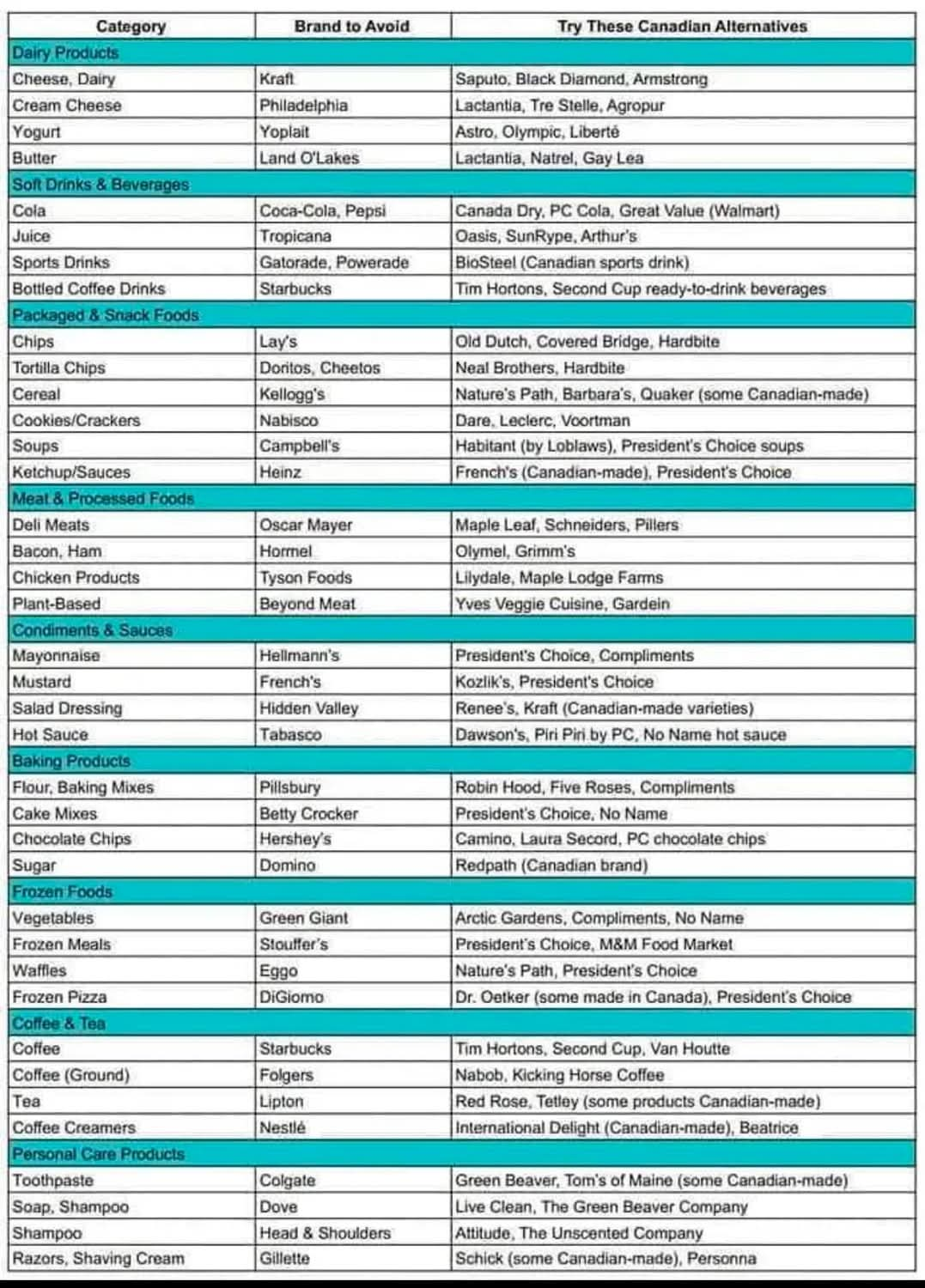this post was submitted on 02 Feb 2025
719 points (98.5% liked)
Canada
7531 readers
856 users here now
What's going on Canada?
Related Communities
🍁 Meta
🗺️ Provinces / Territories
- Alberta
- British Columbia
- Manitoba
- New Brunswick
- Newfoundland and Labrador
- Northwest Territories
- Nova Scotia
- Nunavut
- Ontario
- Prince Edward Island
- Quebec
- Saskatchewan
- Yukon
🏙️ Cities / Local Communities
- Calgary (AB)
- Edmonton (AB)
- Greater Sudbury (ON)
- Guelph (ON)
- Halifax (NS)
- Hamilton (ON)
- Kootenays (BC)
- London (ON)
- Mississauga (ON)
- Montreal (QC)
- Nanaimo (BC)
- Oceanside (BC)
- Ottawa (ON)
- Port Alberni (BC)
- Regina (SK)
- Saskatoon (SK)
- Thunder Bay (ON)
- Toronto (ON)
- Vancouver (BC)
- Vancouver Island (BC)
- Victoria (BC)
- Waterloo (ON)
- Winnipeg (MB)
Sorted alphabetically by city name.
🏒 Sports
Hockey
- Main: c/Hockey
- Calgary Flames
- Edmonton Oilers
- Montréal Canadiens
- Ottawa Senators
- Toronto Maple Leafs
- Vancouver Canucks
- Winnipeg Jets
Football (NFL): incomplete
Football (CFL): incomplete
Baseball
Basketball
Soccer
- Main: /c/CanadaSoccer
- Toronto FC
💻 Schools / Universities
- BC | UBC (U of British Columbia)
- BC | SFU (Simon Fraser U)
- BC | VIU (Vancouver Island U)
- BC | TWU (Trinity Western U)
- ON | UofT (U of Toronto)
- ON | UWO (U of Western Ontario)
- ON | UWaterloo (U of Waterloo)
- ON | UofG (U of Guelph)
- ON | OTU (Ontario Tech U)
- QC | McGill (McGill U)
Sorted by province, then by total full-time enrolment.
💵 Finance, Shopping, Sales
- Personal Finance Canada
- BAPCSalesCanada
- Canadian Investor
- Buy Canadian
- Quebec Finance
- Churning Canada
🗣️ Politics
- General:
- Federal Parties (alphabetical):
- By Province (alphabetical):
🍁 Social / Culture
Rules
- Keep the original title when submitting an article. You can put your own commentary in the body of the post or in the comment section.
Reminder that the rules for lemmy.ca also apply here. See the sidebar on the homepage: lemmy.ca
founded 4 years ago
MODERATORS
you are viewing a single comment's thread
view the rest of the comments
view the rest of the comments

It's good that shipping is cheap in some ways. The problem is that it's cheap because it uses the absolute worst kinds of fuels that are incredibly polluting. The fact that shipping is incredibly cheap is a major reason why the climate is changing.
Hmm. I actually doubt that's true at this point, except for aircraft. The thing is you can't convert everything to EVs overnight.
You doubt what's true? That transportation / shipping is a major contributor to climate change?
"the transportation sector contributes 20.2% of global CO2 emissions"
https://www.undp.org/policy-centre/istanbul/press-releases/windrose-technology-supports-undp-research-universities-zero-emission-trucks-zets
International cargo container shipping is only about 2% of global CO2, but that's still 10% of all transportation-related output coming from shipping alone. Imagine if every 1 in 10 vehicles you saw on the road was a little boat, that's how much international shipping contributes to CO2.
You shouldn't convert everything to EVs overnight. EVs aren't the answer, public transport and alternative transport like biking is the answer. A nasty deisel-based bus almost certainly contributes less to climate change than 30 personal EVs, especially if you consider the entire life cycle.
Transport is going to be the hardest thing to convert to not use fossil fuels, because the biggest advantage of fossil fuels is the massive energy density of the fuel. An EV has to lug massive batteries around with it everywhere it goes, but a gasoline car just needs a relatively small fuel tank. For small personal vehicles it might be possible to accept the compromise, but it's going to be a lot harder to get rid of fossil fuels for buses, trains and especially airplanes and ships. So, the answer there is not to switch to EVs, it's to reduce the use as much as possible. Stop flying around the world. Stop ordering things from overseas. Stop driving personal vehicles and take public transit.
Right now, the biggest sector contributing to global CO2 is electricity and heat production, but solar and wind are getting so cheap that it's just a matter of time for those to be converted. You don't even need to give incentives, the cheapest solution is now the cleanest. The energy density of the fuel doesn't matter in those cases. But, transport's going to be a harder problem, and it's the one we should be working on now.
No. That it can't be done without emissions.
Biking and public transit for cargo?
Cargo bikes exist, and trains are effectively public transit for cargo.
Which can be or not be electric, and which move stuff on and off of trucks and ships, generally.
I think what happened here is that you started talking about a different, important but unrelated issue. I get it, I've done that too, but it's not how you conduct a conversation.